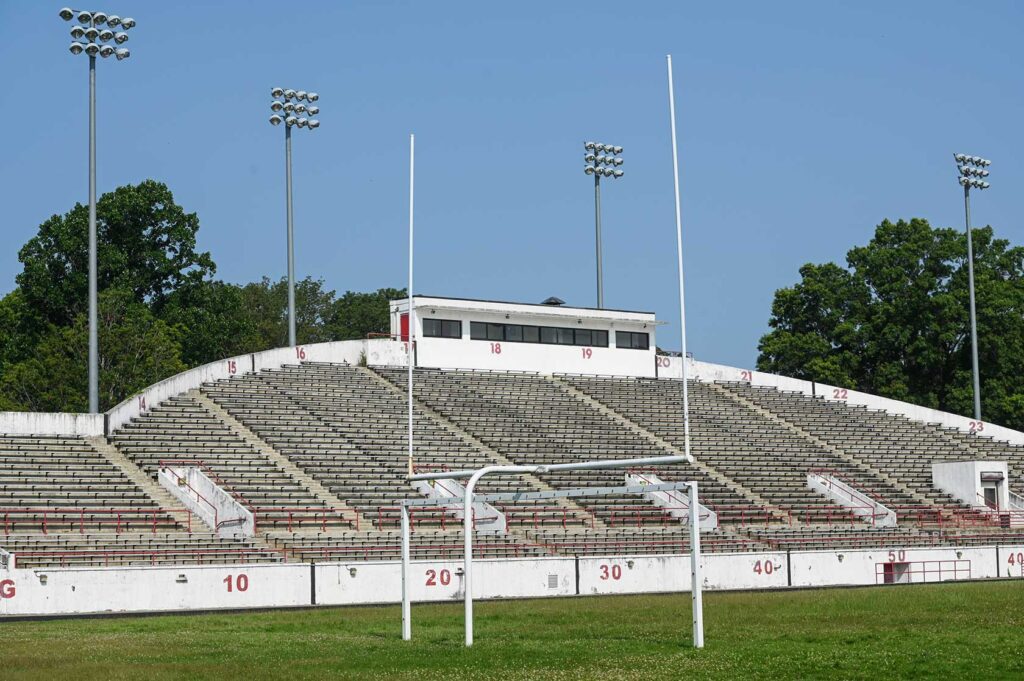Residents largely support White Stadium renovation, survey finds
Some say results fall short of addressing park users’ concerns

More than half of residents generally support the City of Boston’s proposal to renovate White Stadium, a survey released last week found.
One-third are “all for it,” while a quarter “cautiously support” the renovation, according to the survey of 700 residents by the Franklin Park Coalition, an advocacy nonprofit for Franklin Park made up of community groups within the vicinity. Only 1 in 5 respondents were “against it,” though many still have concerns.
The survey results included “hundreds of thoughtful written responses,” according to a press release, and came less than a month after environmental nonprofit Emerald Necklace Conservancy and other Boston and Brookline residents filed a lawsuit against the city and the Boston Unity Soccer Partners group that is seeking to lease the stadium and transform it into a home for a U.S. women’s soccer team. The legal action halted the White Stadium renovation project, citing “unconstitutional privatization of public land.”
The purpose of the survey was to confirm that the coalition was “in line with how park users were thinking and how they were feeling,” said Rickie Thompson, president of the board of the FPC. He said the survey confirmed what the Coalition already knew: Residents were largely interested in moving forward with the project, with conditions.
Louis Elisa, president of the Garrison Trotter Neighborhood Association and a founding member of the FPC, said the survey was “redundant” and unnecessary.
“There is no organization or group that I know of — and I work with about 15 different organizations in District 7, in Mattapan, Dorchester and in Jamaica Plain — that was not in support of the improvements to White Stadium and the improvements to Franklin Park,” said Elisa, who is named as a plaintiff in the lawsuit alongside the Emerald Necklace Conservancy. “[The survey] came months after the processes started. It should have been a survey, if they wanted to get the feel, that they did back in June or July.”
He raised doubts about the comprehensiveness of the survey, saying that it should have gone beyond the basic questions and highlighted park users’ worries.
Since the introduction of the stadium renovation and soccer-use proposal in fall 2023, for example, community members have raised questions about the planned curtailing of stadium use by high school football programs and about reduced access to the potentially privatized area of the park.
Members of the Garrison Trotter Neighborhood Association, Elisa said, have “worked to make Franklin Park better” and are “overjoyed” that the City of Boston is going to “finally do something with White Stadium.” Still, he felt the survey fell short in highlighting residents’ apprehensions.
Meanwhile, City Hall welcomed the results, with Mayor Michelle Wu saying the responses tracked with what they’ve been hearing from abutters. “The Franklin Park Coalition has served as a long time leader in championing community needs for a vibrant, healthy resource at Franklin Park,” said the mayor in a statement. “The results of their survey reflect the conversations the city has had with neighbors, park users, and youth sports participants underscoring the importance of renovating White Stadium to be a state of the art facility for all to benefit.”
The 15-question survey asked residents about their park usage, their familiarity with the renovation proposal and their reservations about it.
The preliminary results released last week did not include mention of specific concerns submitted by respondents. But a full report, set to be shared at a neighborhood meeting on Tuesday, March 19, documented the issues Elisa alluded to, including access, traffic, parking, environmental preservation and more. Of the 600 people who responded to a question about concerns, just 1 in 10 said they had none.
The survey, Thompson said, was not uniquely about the residents’ concerns but rather aimed to gauge support for the project. Either way, he said, the community partners and Boston Public Schools have been receptive to feedback.
“So far, the team has been fairly responsive on most of the things that we brought up,” he said. “The parking and the transportation to the games is still a biggie, and that was something that was still being worked on. Most things that we brought up, they were really responsive.”
Several ongoing development projects in the Franklin Park area have received similar pushback, including the proposed redesign of Blue Hill Avenue that would add a center bus lane to the roadway.
“When you’re talking about something of this magnitude, all of the … proposals, whether it be White Stadium, Franklin Park or Blue Hill Avenue, none of it can be taken by themselves … They don’t operate independently,” said Fatima Ali-Salaam, chair of the Greater Mattapan Neighborhood Council, who said she regularly walks through Franklin Park.
Ali-Salaam agreed that the FPC’s survey was not revelatory and said White Stadium’s renovation was never the issue. Instead, the question is about access, she said, when it comes to any of the proposed projects in the greater Mattapan area: the Blue Hill Avenue transportation action plan, the Franklin Park Action Plan or the redevelopment of the Shattuck Hospital site.
As for White Stadium, residents, abutters and advocacy groups also have raised concerns about how the plans will affect the quality of life for surrounding communities and the community events and activities that rely on the park.
“However everything works out to be at the end,” said Ali-Salaam, “I would think that anybody who would be involved would say, no matter what, the responsibility that we have as a city is to make sure that the amenities that are there and inherent are supposed to be taken care of for our students. I don’t think that anybody would say that that is not important.”






